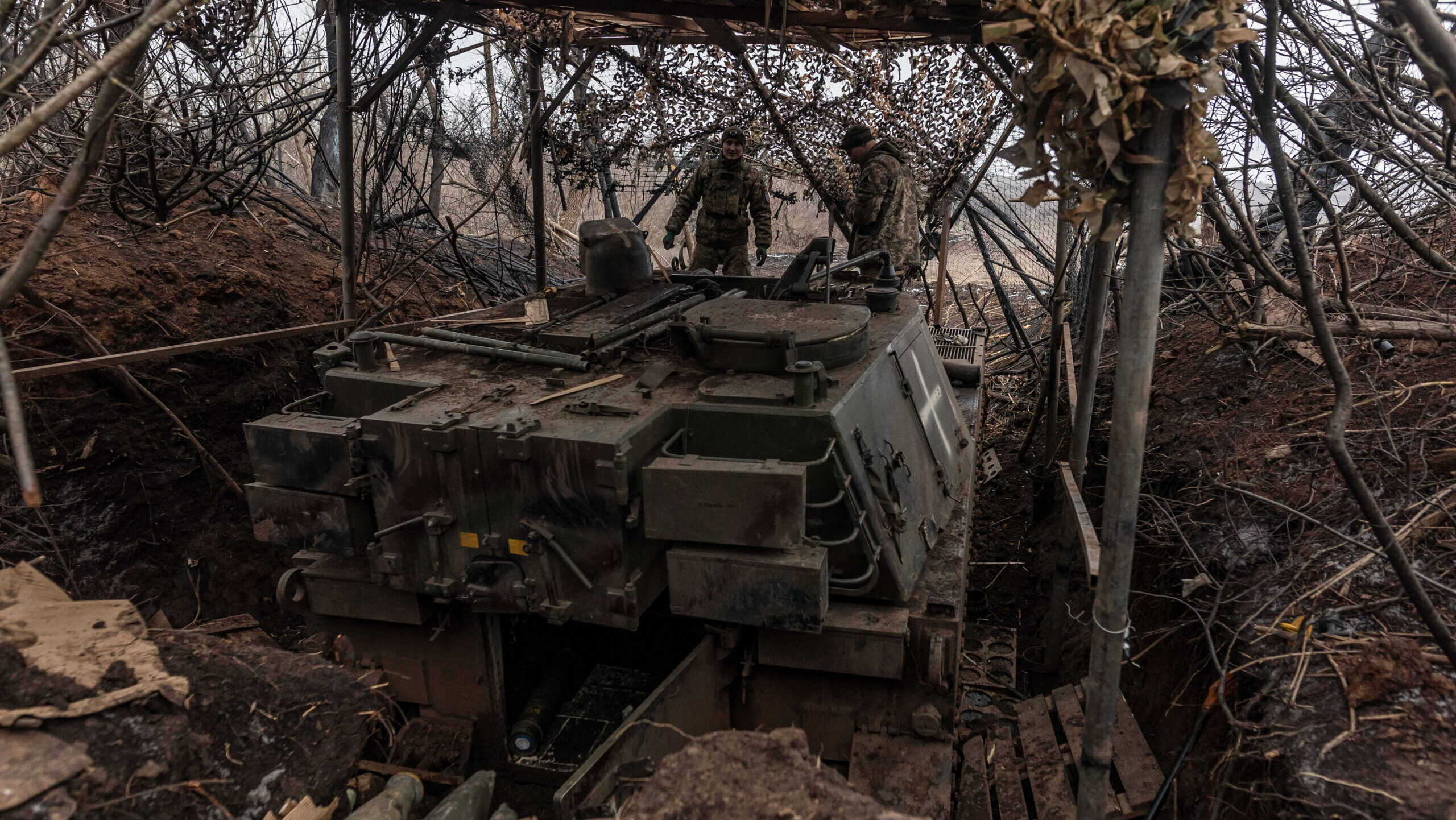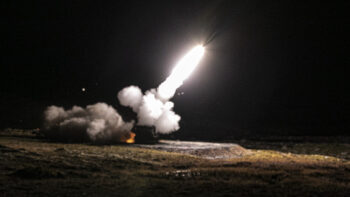
DONETSK OBLAST, UKRAINE – 22 FEBRUARY: Ukrainian soldiers on the M109 artillery in the direction of Bakhmut, Donetsk Oblast, Ukraine, 22 February 2024 (Photo by Diego Herrera Carcedo/Anadolu via Getty Images)
WASHINGTON — As Congress continues to hold off on passing a Ukraine supplemental bill, the White House today unveiled a new $300 million weapons package for Ukraine — despite having warned for months that it was, effectively, out of money to fund such a deal.
The package, which includes munitions for the Guided Multiple Launch Rocket System and Stinger weapons, plus 155-mm and 105-mm artillery rounds, was announced just hours after key national intelligence leaders were on the Hill, warning members that a failure to give Ukraine more military aid could hand victory to Russian President Vladimir Putin.
“Ukraine is not running out of courage and tenacity,” CIA director William Burns told the House Intelligence Committee this morning. “They’re running out of ammunition, and we’re running out of time to help them.”
In a call with reporters announcing the new package, National Security Advisor Jake Sullivan hit the same points, saying “Ukraine does not have enough ammunition to fire back. That’s costing terrain, it’s costing lives and it’s costing us, the United States and NATO alliance, strategically.
RELATED: Ukraine war turns 2: Lessons learned and what comes next
“This ammunition will keep Ukraine’s guns firing for a period, but only a short period. It is nowhere near enough to meet Ukraine battlefield needs and it will not prevent Ukraine from running out of ammunition in the weeks to come,” he later added.
Today’s presidential drawdown package (PDA) for Kyiv the first one this calendar year. In December, the Defense Department announced that while it still had $4 billion in Congressional authority to pull weapons from its stocks, it was out of dollars to actually buy new weapons to replenish those. In other words, the US could legally send more weapons to Ukraine, but it would mean leaving the US military without ready ways to replace them in the near future if the Pentagon needed them for America’s own defense.
In the intervening months, the Pentagon has also said it is actually $10 billion in the hole due to previous weapons shipments. Two senior defense officials told reporters today that the $10 billion shortfall was created because the department had originally assumed a 10 percent markup when buying weapons to refill stocks. Realistically, that figure turned out to be closer to 20 percent, and the department didn’t have a firm grasp on the ballooning figure until the second half of 2023.
However, two officials speaking on background ahead of today’s announcement said that it was possible to make it happen thanks to a rarity for the Pentagon — cheaper than expected weapon buys.
When the Army inked contracts with industry, it was able to find cost savings with buys like the 25-millimeter ammunition or Joint Light Tactical Vehicles (JLTVs), the first defense official said. As an example, when the Army went to purchase 120,000-plus rounds of 25-millimeter munitions, it predicted spending $130 on each round. That price point turned out to be $93, a 28 percent savings per unit.
“This has happened before, we’ve had savings, significant savings, for example, from Javelin, Stryker and HIMARS awards,” the defense official said. ”So, it is not routine but it’s also not unprecedented.”
Instead of absorbing those cost savings and starting to fill in that $10 billion financial hole, the administration is opting to funnel those cost savings back to Ukraine via today’s package announcement.
“The president, [defense] secretary and others are concerned about what’s happening, and we’re looking to see if there was anything we could do,” the second defense official said. “As that discussion was ongoing, savings were starting to come in, which has happened before and may happen again.”
“There’s kind of a sea change in the difficulty of getting Congress to continue supporting Ukraine,” the second defense official said, adding later that “Having that kind of change in situation means you got to take a different risk calculus about going any further. It’s no longer assured that you’re going to get help.”
That decision, though, does not negate the administration’s plea for Congress to pass a supplemental spending bill that will help with that $10 billion financial shortfall and provide additional military support for Ukraine at a time when its stocks are dwindling and Russia appears to have momentum as the war enters its third year.
Growing Concern
Just hours before today’s announcement, the head of the Central Intelligence Agency warned that Ukraine is in danger of losing “significant ground” to Russia if Congress fails to pass a $105 billion supplemental funding bill that includes aid for Ukraine.
Burns said that during a recent trip to the country, Ukrainian military and intelligence officials said that troops reported running out of munitions during the battle of Avdiivka, which resulted in Ukraine’s retreat from the Eastern city on Feb. 17.
Ukrainian forces have begun rationing artillery and anti-air munitions, putting them at a disadvantage against Russian attacks, Burns said. Ukrainian officials told Burns that one 2,500 person brigade fighting in Avdiivka had limited itself to just 15 155 artillery munitions per day, while another brigade had a total of only 42 mortar rounds available at the time of the retreat.
“What I worry about in ’24, without supplemental assistance, is that you’re going to see more of Avdiivka because Ukraine is going to lose more ground — notwithstanding their courage and tenacity —and maybe significant ground over time,” he said. “That kind of an outcome will stoke the ambitions of the Chinese leadership, and they’re going to undermine the faith that our partners and allies in the Indo-Pacific have in our reliability as well.”
Burns added that Putin is not serious negotiating a real compromise with Ukraine, only the “theater of negotiation” where he can dictate terms to Ukraine — a situation that could be likely a year from now if Ukraine does not receiving additional military aid from the United States
“With supplemental assistance, I think it’s possible to puncture his arrogance, his confidence that time is on his side, and put Ukrainians in a position where they could negotiate an outcome from a position of relative strength,” he said.
Director of National Intelligence Avril Haynes underscored Burn’s comments, stating that passing a supplemental was an “urgent” matter.
Taking aim: Army leaders ponder mix of precision munitions vs conventional
Three four-star US Army generals this week weighed in with their opinions about finding the right balance between conventional and high-tech munitions – but the answers aren’t easy.


























